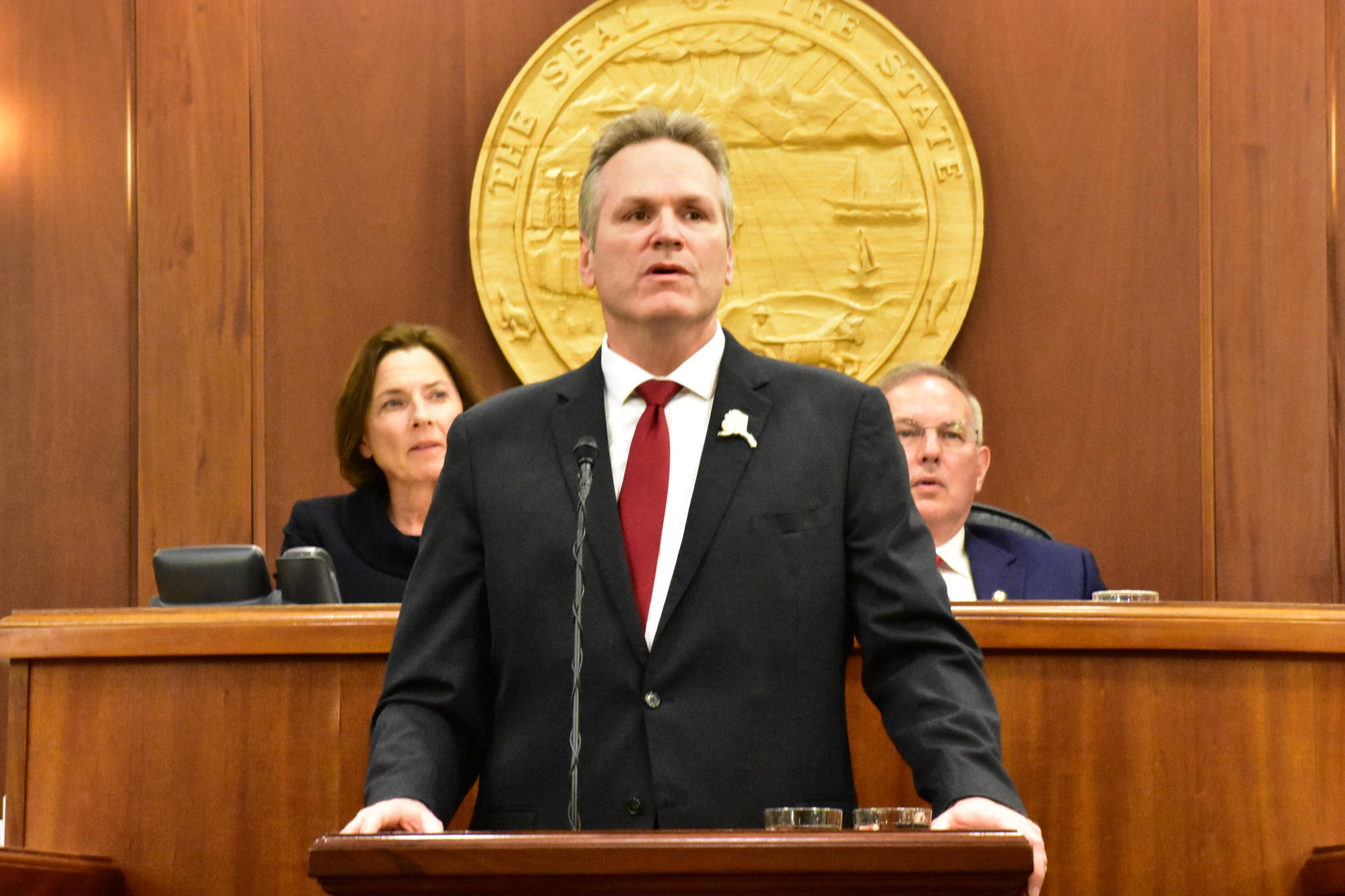Members of the bipartisan House Majority Caucus said they were pleased to hear an encouraging tone coming from Gov. Mike Dunleavy in his State of the State address Monday night, but one issue still hung over the speech: the Permanent Fund Dividend.
“The thing that was most concerning to me,” Rep. Neal Foster, D-Nome, said, “he talked about having a sustainable long-term plan, however, the budget that he introduced had a $1.5 billion dollar deficit in it.”
The governor addressed a joint session of the Alaska Legislature in the House Chambers at the Capitol, in a speech where he touted the state’s mineral resources and potential for development. He made several proposals during his speech, but absent from the governor’s address was how the state would pay for any new programs after major cut backs last year and a limited budget this year.
[Read the governor’s State of the State address]
When the governor released his budget in December he proposed spending $2 billion to pay a full PFD. But doing so would draw down state savings to $540 million, an amount some legislators have said is dangerously low.
The governor made several proposals during his speech, the most dramatic of which was introducing a statewide lottery as a means of raising revenue for the state.
“Forty-five states have lotteries in place, and it’s past time for Alaskans and visitors to have the option to individually contribute to fixing Alaska’s fiscal issue,” Dunleavy said.
But a statewide lottery wouldn’t make that much money for the state, according to House Majority Leader Steve Thompson, R-Fairbanks. Thompson said he had been researching a state lottery for his own bill, and while it would indeed bring in money, it wouldn’t be enough to cover the state’s costs.
“We’re looking at only about $10 million dollars (a year), at least to start,” Thompson said. “Those (funds) aren’t enough to solve our problems, but they are a good place to start.”
Thompson said his research had looked at potentially putting part of the revenue raised by a state lottery into a trust fund for education, thereby generating funds for future educational need. Most of the money would go to the general fund, Thompson said.
Dunleavy said he had instructed the Department of Administration to identify “waste, fraud and abuse,” and look for ways to modernize how government does business. He said also he would be proposing a state Inspector General “who will promote accountability, integrity, and efficiency in government by investigating careless and fraudulent spending.”
But while lawmakers said they were encouraged by some of the governor’s proposals and looked forward to working with his administration, questions remained about how the state would pay for any new programs.
“There were costs in a lot of his proposals,” said Rep. Jennifer Johnston, R-Anchorage, co-chair of the House Finance Committee. “How are we going to pay for these addition programs when you have a budget that, when you include a full dividend, doesn’t pay for itself?”
Dunleavy stressed the importance of Alaska being able to exploit its natural resources for the benefit of the state.
“We’re meeting with investors nationally and abroad to highlight Alaska’s unparalleled potential,” he said. “Alaska is a state with immense resources and economic opportunity.”
Timber was an industry Dunleavy said he wanted to see developed. He mentioned his efforts to lift the Roadless Rule, a law which currently inhibits development, on the Tongass National Forest. The Roadless Rule, which Dunleavy called devastating, “may soon be history, and the Tongass restored to a managed multi-use forest as it was always intended.”
He also proposed giving Alaskans a chance to exchange their PFD checks for double the check’s value towards the purchase of land. That would help the state’s treasury while giving Alaskans a better chance to own land, what he called a core American value.
Edgmon said that idea had been considered before, and that it was worth looking at. Since it was only the first week of the legislative session, it was too soon to know what kind of fiscal impact that might have.
But the issue of the PFD was largely absent from the governor’s speech, which to many of the legislators in the House majority left a number of things yet to be determined. Edgmon referred to the PFD issue as “the elephant in the room.” The most important thing was to create a budget first, Johnston said, to show the people of Alaska the Legislature is committed to fiscal responsibility.
“Our target as a caucus was to pay the dividend we can afford,” Rep. Chuck Kopp, R-Anchorage, said. “If we don’t solve the dividend problem, it will always muddy the water on what exactly are we looking at.”

